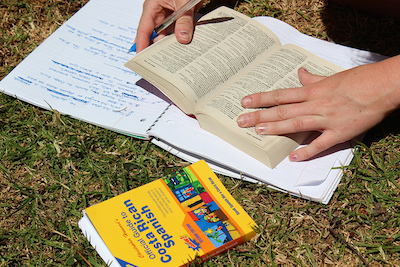Career Benefits of Studying Abroad: It’s Not Just a Vacation
If you’re someone who enjoys traveling, or dreams of traveling in the future, studying abroad as a college student is likely an academic option you’ve at least considered. And while the idea of of traveling overseas and experiencing a foreign culture can be thrilling, in order to get the most out of studying abroad it’s important to recognize that studying abroad is more than a vacation – it’s a chance to enhance your college education, and develop real-world skills that look great on your resume. Here’s a brief overview of ways in which studying abroad translates to personal development and career benefits, including specific marketable job skills gained from studying abroad.
Studying abroad and future career success
n general, studying abroad can positively impact a student’s employment opportunities, salary, and future graduate or professional studies following graduation. The Institute for the International Education of Students (IES) Abroad found the following results from a survey for recent graduates from which they received over 1,000 responses:
- One year after graduation, 97% of students who studied abroad through an international program were employed, compared to 49% of general college graduates in the same timeframe. Moreover, 89% of students who studied abroad found a job within only six months after graduation, half of whom secured a job while still in school.
- College graduates who studied abroad had an annual salary of $7000 more than the survey participants from the general college graduate population.
- For students who decided to continue their studies in a graduate or professional program, 90% of study abroad alumni were accepted to either their first or second choice programs.
Marketable job skills gained from studying abroad
Studying abroad is an ideal opportunity to develop skills and experience that translate to a successful career following graduation. According to the same IES Abroad survey mentioned above, nearly 85% of students who studied abroad believed that their experience was ‘effective’ or ‘very effective’ in building job skills.
Following is a list of desirable traits and skills you can gain from studying abroad, according to reputable international education organizations such as The National Association of Foreign Student Advisors (NAFSA) and Universities Study Abroad Consortium:
- Foreign language skills
- Cross-cultural communication
- Motivation
- Initiative
- Flexibility
- Adaptability
- Creativity
- Independence
- Responsibility
- Organization
- Crisis and resource management
- Patience
- Enthusiasm
- Intellectual curiosity
- Perseverance
- Time management
- Understanding of global, economic, and political issues
For a better idea of how experiences gained from studying abroad can translate to some of these specific skills listed above, the article “How to Highlight Your Study Abroad Experience in a Job Interview” provides some great examples.
Personal impact of studying abroad: past students reflect
While the statistics listed above regarding employment of study abroad alumni look promising, it’s also important to consider the personal accounts of these students. For instance, do study abroad alumni believe that studying abroad was a defining experience in their personal and career development? How did studying abroad impact their career choices and values?
A study conducted by the American Institute For Foreign Study (AIFS) Abroad yielded the following results in regards to the impact studying abroad has on students’ careers:
· Over half (56%) of study abroad alumni agreed that studying abroad “contributed to developing skills and intercultural competencies which contributed to obtaining my first job after graduation.”
· Over one third (34%) of alumni believe that studying abroad contributed to their choice of field of employment.
· The vast majority (80%) of alumni believe that studying abroad contributed to their “ability to adapt in diverse workplace environments.”
· Two-thirds (65%) reported that studying abroad affected the “importance placed on working in a field that they find interesting,” and 70% said their experience contributed to an increased “…importance placed on having personal fulfillment in [their] work.”
The same survey also found that the majority of study abroad alumni believe that studying overseas had a direct impact on their personal development. For instance, survey participants believed that studying abroad directly contributed to:
- A better understanding of themselves and their values (92%)
- A sense of confidence in new situations or when meeting new people (93%)
- The ability to accept differences in other people (86%)
- The ability to be more flexible and open-minded (89%)
- An increased tolerance of ambiguity in a variety of situations (84%)
- The ability to be independent (95%)
- The ability to take initiative (87%)
The decision to study abroad can be a life-changing one. And while the results of the surveys discussed above suggest that studying abroad can have a very positive impact on students’ career and lives, the student does carry a large chunk of responsibility in terms of how much they grow and learn during their time abroad and in being able to articulate the benefit of those experiences to future employers.
Ready to take your study abroad research to the next level? Our articles “Study Abroad: 3 Basic Questions to Ask” and “Study Abroad Advice for the Future Student Traveler” are rich with articles and resources that address questions prospective study abroad students tend to have!
Photo: A student studies in Heredia, Costa Rica. Image: The LEAF Project / Flickr


5 Comments